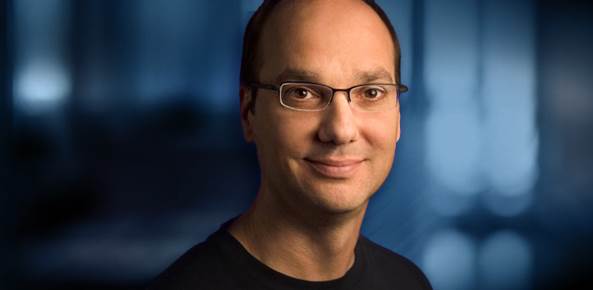Could artificial intelligence (AI) soon become so powerful that it can run every connected device we own? The answer is yes, according to Andy Rubin, co-founder of Android and leader of Google’s robotic efforts. Between quantum computing and advancements in artificial intelligence, a conscious intelligence could emerge that would help form the foundation of every piece of technology, said Rubin.
Quantum computing refers to exponential increases in processing power made possible in part by exploiting the probabilistic nature of physics, Rubin said yesterday at Bloomberg’s Tech Conference in San Francisco. “If you have computing that is as powerful as this could be, you might only need one [machine],” he said. “It might not be something you carry around; it just has to be conscious.”
Walking Mobile Sensors
Rubin (pictured above) has a stake in bringing his theoretical ideas to life. His investment fund, Playground Global, is helping to fund companies trying to turn his quantum predictions into reality. One computing company, which Rubin didn’t name, is researching the idea of commercializing quantum devices via conventional manufacturing means, something that hasn’t yet been done.
A lot of future innovation will take place at the intersection of quantum computing, AI, and robotics, according to Rubin. “In order for AI to blossom and fulfill consumer needs, it has to be about data,” he told conference attendees. “That’s where robotics come in — robots are walking mobile sensors, who can sense their environment and interact and learn from those interactions.”
As futuristic as it all sounds, Rubin’s vision is not unrealistic, Rob Enderle, principal analyst at the Enderle Group, told us today. His concept is plausible, Enderle said. “In effect, AI will likely manage everything around us at some point, including our perception of reality. Some argue that this may have already happened,” he said. “His comment on only needing one is very similar to what some folks originally said about computers. While one is possible, it is likely we’ll have a lot of these.”
AI To Be Feared?
Rubin encouraged the audience to set aside scary visions of AI that have been fostered by purveyors of science fiction. “If you think about quantum computing without AI, if you think about how that new type of architecture could eliminate all forms of encryption we have today, you have different problems,” Rubin said.
“You shouldn’t be worrying about Skynet coming online,” he added, referring to the AI system that battled with Arnold Schwarzenegger in the “Terminator” movies. “You should be worrying about what it means to compute at these magnitudes.”
Whether or not the quantum and AI machines of the future are hostile or not will probably depend on factors such as the quality of the code that makes them run, the purpose of the machine and whether or not it recognizes us as something to be protected or a problem to be eliminated, Enderle said. “But the part that most technology items will somehow be connected through some type of AI is a viable prediction,” he added.







